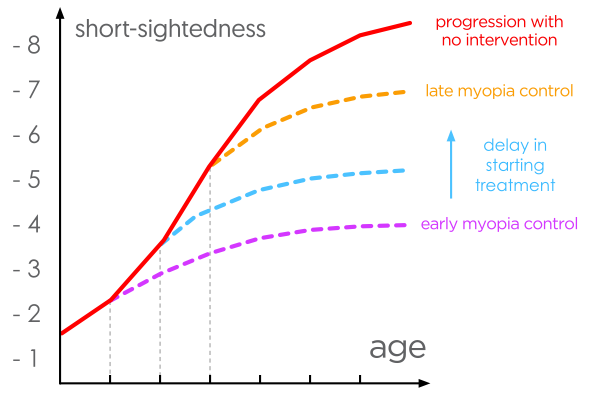Myopia Control Treatment
High Myopia Is Now Preventable
Slowing the Progression of Myopia
Our Myopia Control treatment program represents a new approach to managing nearsightedness (myopia).
In the past, and is still the case at the majority of regular optometrists, the main method of correcting nearsightedness in children and teenagers has been with glasses, with little or no attempt at slowing the rate of eyesight deterioration in these children while their short-sightedness progressed year by year, and their lenses got stronger and thicker at each visit. Meanwhile, with their increasing level of short-sightedness and growth of their eyeball, the risk to the child’s long-term eye health is also increasing each year.
At O’Fallon Family Eyecare, we take a proactive approach in controlling childhood myopia. By prescribing treatments to prevent and delay the onset of myopia, and slowing the rate of myopia progression in short-sighted children and teenagers, we reduce the risk of potential myopia-related vision loss in these children’s lifetime. So that they can enjoy better vision and the confidence of healthier eyes for the rest of their lives.
It’s Time To Change Our Way Of Thinking
With our Myopia Control program we apply the latest scientific research in myopia control to help stabilise your child’s eyesight. Effective and safe treatment options are now available to slow short-sightedness progression by 30-75% (average reduction of 50%) in suitable children. This significantly reduces your child’s risk of developing high degrees of short-sightedness and the associated risks of serious eye diseases and potential vision loss later in adulthood.
Where a high risk of progression is identified, we recommend starting myopia control treatment as soon as a significant and consistent myopia increase has been observed. A documented increase of -1.00D or more in one year (or over 2 review visits) over the baseline prescription is considered significant progression.
The types of suitable treatment available may vary with age, but there is no minimum age for starting myopia control in a child with advancing myopia. The earlier the treatment is started, the better the eventual outcome for the child. Your optometrist will guide you through the options and, together with you, decide on an individualised treatment plan most suited for your child.
The Goal of Treatment is to Avoid Developing High Myopia.
The age of initiating myopia control treatment can greatly affect the eventual amount of myopia developed. Each year of delay during the critical period of rapid progression makes a considerable difference to whether or not the child will have high myopia, or even extreme myopia, for life.
High levels of myopia are associated with significantly increased risks of eye diseases. Glaucoma, retinal detachment and myopic macular degeneration are all serious, sight-threatening eye conditions.
Vision loss at any age can be life-changing, and certainly prevention is better than cure. While there is no ‘safe’ level of short-sightedness, we can lessen the risk of vision loss in an individual’s lifetime by aiming to keeping a child’s level of myopia as low as possible with treatment.

What Myopia Control Treatments are Available?
(Click on the title to learn more about each treatment.)
Orthokeratology
Wearing special lenses while you sleep overnight, ortho-K is one of the best ways to slow myopic progression.
Atropine Eye Drops
Simply using one drop every night ad bedtime has shown significant myopia control.
Multifocal Contact Lenses
A few carefully selected designs of multifocal soft contacts can be helpful in slowing myopic changes.
